|
New England Spring Arrives
aka, Monsoon Season
Background Song:
Here Comes the Rain Again
By Eurythmics
|
|
Click thumbnails below for a larger picture |
|
March 31, 2010 |
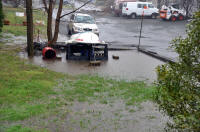 |
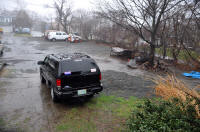 |
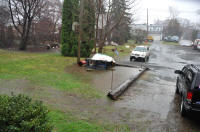 |
|
Yesterday the torrential rain of 2010
Monsoon Storm #3 continued. Two weeks ago, it rained so hard it flooded
my small cellar, put out the gas furnace and hot water heater. (Mar. 31, 2010) |
This time the bilge pump in the
cellar crawl space kept up with the three-day deluge, since I replaced
its cracked exhaust hose. This time, it was Barbara's basement that was
flooded, her furnace and hot water heated that was drowned. |
Yesterday we broke the all-time record for
rainfall in March, when more than ten inches over the month was
surpassed. My yard and lot turned into a pond and running river. |
 |
|
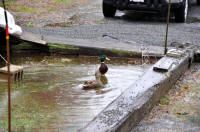 |
|
The heavy runoff coming in from the street created rapids
where it passed by the wood racks and emptied into the neighbors' yard
just before and beyond Chip Ahoy. |
|
It sure was a good day for ducks, and this
pair of Mallards, visiting regulars, enjoyed the newly-formed pond alongside the dinghy. |
|
Monsoon photos from today's Salem
News |
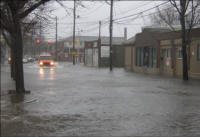 |
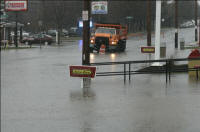 |
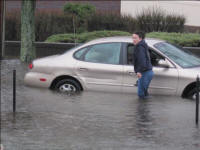 |
|
Walnut Street, Peabody -- just off Peabody Square,
which was under feet of water again. |
Canal Street, Salem -- looking more like a canal than a
street. |
Railroad Avenue, just off flooded Peabody Square, alongside the courthouse. |
The Boston Globe
Wednesday, March 31, 2010
Wading through the crisis
Hundreds routed but few injuries;
Rising river levels still on flood
watch
By David Abel, Globe Staff
As relentless
rain pelted the region yet again yesterday,
hundreds of people were evacuated from inundated
homes, authorities closed numerous water-clogged
roads, and officials managing an overwhelmed
drainage system narrowly avoided releasing
sewage into Boston Harbor.
The record-breaking storm, which pushed streams
and rivers past their banks, prompted Governor
Deval Patrick to deploy 1,000 National Guardsmen
statewide to deliver thousands of sandbags in an
effort to stem the surge.
“We’ve had two 50-year storms in the course of
two to three weeks,’’ Patrick told reporters at
the state highway barn in Lexington, where
Massachusetts National Guard members filled
sandbags. “This is unheard of. This is . . . a
little bit more dangerous due to the saturation
from the previous storm. This could cause
floodwaters to rise very, very fast.’’
By the time the storm ends this morning, 3 to 6
inches of rain will have fallen in the Boston
area, with 6 to 8 inches in portions of
Southeastern Massachusetts, said Kim Buttrick, a
meteorologist at the National Weather Service in
Taunton.
Boston has received more than 14 inches of rain
this month, the city’s rainiest March on record.
The previous high was 11 inches, a mark set in
1953. This week’s rain, the third major storm in
two weeks, also made it the second-wettest month
in the history of Boston, below the
record-setting 17.09 inches of rainfall in
August 1955.
As of last night, state officials said they had
reports of only minor injuries resulting from
the storm. The injured included State Trooper
Patrick Ahl and the unidentified woman he
rescued when her car became stranded in a deep
puddle on the shoulder of Interstate 95 near the
Danvers/Peabody line.
Guardsmen and state Environmental Police in Fall
River assisted in the evacuation of about 300
people. In Clinton, they stood by in case the
town needed to build sandbag walls near the
Wachusett Reservoir and the Nashua River.
Throughout the day, state officials closely
watched swollen rivers, especially in the
Merrimack Valley, and monitored water levels
behind 39 dams across the state. The priority
for dam watchers was the troubled Forge Pond Dam
in Freetown, which sparked concern earlier this
month, said Rick Sullivan, head of the state
Department of Conservation and Recreation.
“We are obviously being very vigilant,’’
Sullivan said.
On Monday, Patrick declared a statewide state of
emergency, and President Obama declared
Massachusetts a federal disaster area, allowing
businesses and homeowners to apply for grants
and low-interest loans to help them recover from
the floods.
Major General Joseph Carter, commander of the
Massachusetts National Guard, said soldiers had
delivered some of the 8,500 sandbags they had
prepared to various communities.
“Our Guardsmen have dropped what they were doing
. . . and they’ve come in to duty to assist,’’
Carter said.
Peter Judge, a spokesman for the Massachusetts
Emergency Management Agency, said all the
state’s rivers yesterday afternoon were “above
flood state, with the expectation that many will
end up at major flood stage before this is
over.’’
He said the Sudbury and Assabet rivers were
expected to reach record heights. Most rivers
are not expected to crest until tomorrow.
“We’re watching every river carefully,’’ he
said. “Local officials are taking precautions to
evacuate folks downstream of several dams.’’
Officials at the Massachusetts Water Resources
Authority said yesterday that they had been
closely monitoring the state’s sewer systems,
which approached but stayed below maximum
capacity. Officials breathed a sign of relief
last night as they did not have to dump up to 10
million gallons of raw sewage into Boston Harbor
as a way to prevent the backup of waste water
into customers’ homes and stave off damage to
the system.
During a previous storm this month, the MWRA
released a similar amount of sewage into the
harbor.
“As of now [11:30 p.m.] we have not had to,’’
said Ria Convery, a spokeswoman for MWRA. “We
got lucky this time. Knock on wood.’’
In Rhode Island, hundreds of residents were
evacuated from homes as the Pawtuxet River
surged above record levels. State officials had
made several overnight shelters available to
those forced out of their homes.
In West Warwick, Linda Keller, 58, and her
neighbors had to be evacuated by boat after
their multifamily home flooded. Keller described
the evacuation as harrowing.
“I was hysterical,’’ said Keller, who clutched a
bag filled with medications.
In Fall River, Mayor William A. Flanagan
declared a state of emergency, and members of
the National Guard and deputies from the Bristol
County Sheriff’s Department used Humvees and
prisoner transport vans to evacuate residents.
“Mother Nature has not been kind to the city of
Fall River,’’ Flanagan said. “There is massive
flooding.’’
Flanagan said areas most affected were along
North and South Watuppa Ponds. He also said rain
had scoured out Mount Hope Avenue, one of the
city’s main arteries.
On Judge Street, Renay Stiles watched as the
South Watuppa flooded her basement and the
living rooms of neighbors’ homes.
“It’s horrible out here,’’ said Stiles, 50, who
struggled to shut her back door yesterday when
water began gushing inside.
A number of communities in Eastern Massachusetts
reported flooding, including Wayland near the
Sudbury River and Heards Pond, and Lakeville
near the Assawompsett and Long ponds. In
Middleborough, Pat Rogers, chairman of the Board
of Selectmen, said the town’s wastewater
treatment plant had flooded and raw sewage was
being discharged into the river.
“What makes this [storm] have a greater impact
is because it’s coming on the heels of a
significant event,’’ said Buttrick, the
meteorologist. “The water table is high, and in
many communities, the water has no place to go.
. . . The communities of Massachusetts are
waterlogged.’’
Flood warnings were extended for the Merrimack
River at Lowell, Nashua River at East Pepperell,
North Nashua River at Fitchburg, Spicket River
near Methuen, Squannacook River at West Groton,
the Shawsheen near Wilmington, and the
Blackstone at Northbridge. Warnings continued
for the Assabet River at Maynard, Sudbury River
at Framingham, Concord River at Lowell, the
Charles at Dover, and the Neponset at Norwood.
Major highways in Greater Boston were not
seriously affected by the storm, though some
ramps and smaller state highways had closed,
said Colin Durrant, spokesman for the
Massachusetts Department of Transportation. He
said pumps were operating in Littleton, where a
culvert collapsed on Monday, causing concerns
about water levels in Spectacle Pond.
Elsewhere, the rain caused scattered delays,
diversions, and service outages for buses and
trains throughout the region.
On the MBTA’s Framingham/Worcester commuter rail
line, where the tracks are owned and maintained
by the rail company CSX, the company imposed
speed restrictions for all trains.
Flooding of the tracks in Rhode Island blocked
the commuter rail but did not disrupt service
for Amtrak’s Northeast Regional and Acela lines,
because they operate higher on the rails. Both
lines were reduced to a single track through
much of Rhode Island and into Connecticut,
causing a delay of 30 to 45 minutes, said Vernae
Graham, an Amtrak spokeswoman.
In Boston, Massachusetts Bay Transportation
Authority officials carefully monitored the
water level in the Muddy River, with a crew
waiting to deploy sandbags to protect Green Line
trolley service should the water rise above 15
feet. That strategy had not been needed for five
years before being required twice earlier this
month, said Joe Pesaturo, MBTA spokesman.
The T fared better than it did two weeks ago,
when substantial rainfall washed out a section
of track bed along the Green Line in Newton and
eroded the rail bed in Braintree on the
Middleborough commuter rail line.
“We haven’t had anything of that magnitude, with
the exception of the flooding in Rhode Island,’’
Pesaturo said.
Martin Finucane, John R. Ellement, Travis
Andersen, Brian Ballou, Eric Moskowitz, Jonathan
Saltzman and John M. Guilfoil of the Globe staff
and Globe correspondent Shana Wickett
contributed to this report.
The Boston
Herald
Wednesday, March 31, 2010
2010 brings a rain of terror
By O’Ryan Johnson and Richard Weir
The great
flood of 2010 continued to spread more misery
yesterday, stranding drivers in submerged cars,
causing raging rivers to wash out streets, and
forcing weary homeowners to bail out their
basements and hundreds of others to flee.
The flooding could worsen today as rivers such
as the Charles are set to crest after the
water-logged state received record rainfalls.
For Iraq war veteran John Colasanti, yesterday
was a complete washout as he and a dozen other
drivers made the mistake of trying to drive
through a flooded Spring Street in Everett, only
to have their cars die in knee-deep water.
“The whole street was just one big, giant
lake,”said Colasanti, 43, of Everett, who, along
with his brother, Joe, a passenger, pushed his
stalled GMC Envoy to dry land before getting it
towed to a garage.
State Trooper Patrick Ahl yesterday waded
through chest-deep water to reach a 28-year-old
Weymouth woman whose Nissan was quickly filling
with water after it skidded off Interstate 95 in
Danvers and into a water-filled gully.
“She was floating in her car,” Ahl said of the
driver, who he and two other troopers rescued
after breaking a passenger window.
State transportation officials warned drivers
and straphangers to expect long delays with
today’s morning commute, as the downpours
continue to cause pooling on major highways and
along railways.
The historic floods also pushed already swollen
New England rivers to peak levels as the
rainstorm turned the month of March into the
second wettest on record.
The storm dumped nearly 4.5 inches of rain on
the Hub, which by yesterday evening recorded
14.19 inches of rainfall for the month, making
it the wettest March on record and the second
rainest in history, just 3 inches shy of the
chart-topping 17.09 inches that fell in August
1955, said National Weather Service
meteorologist Alan Dunham.
Massachusetts Emergency Management Agency
spokesman Peter Judge said the Fall River area
has been hardest hit by the storm, forcing parts
of Route 24 to be shut down and hundreds of
residents to be evacuated.
The Red Cross said families sought relief at
emergency shelters in Lawrence and Freetown,
while shelters in Somerset, Brockton, Weymouth
and Framingham remained on standby.
In Lakeville, resident Edward Rand said nearby
Long Pond overflowed its banks and filled his
home’s crawlspace with water.
“We’ve been pumping nonstop and we’re losing,”
he said.
|
|
 |
 |
 |